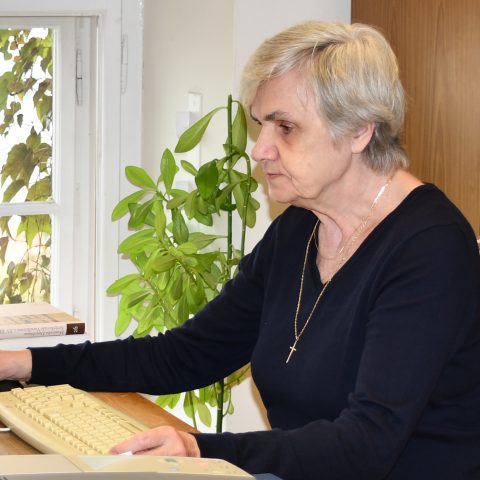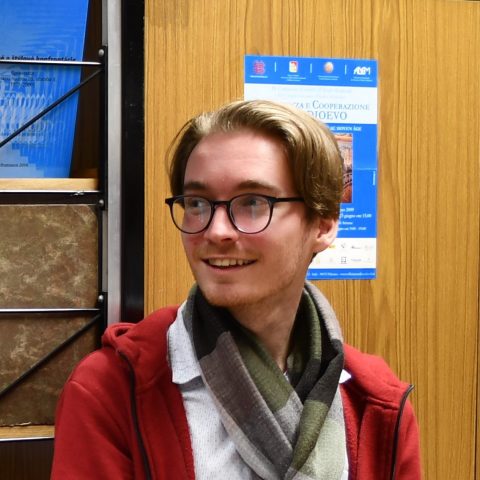At the start of the project in 2019, the team consisted of only four members and an external contributor. As the research has expanded, deepened, and differentiated, the team grew: we were pleased to welcome several young musicology and church music students from the Ferenc Liszt Music Academy. In November 2022, at the beginning of the fourth year of the project, the research group has nine members.

Zsuzsa Czagány
Leader of the research group. Senior researcher at the Institute for Musicology of the Research Centre for the Humanities, head of the Department of Early Music History. Coordinator of the research on fragments, mentor of the project at home and abroad.
mail
Gabriella Gilányi
Senior researcher at the Department of Early Music History, Institute for Musicology of the Research Centre for the Humanities. Chief paleographer, in charge of notation research, creator and maintainer of the website neuma.zti.hu, an active participant in fragment research.
mail
Gábriel Szoliva OFM
A Franciscan friar and Roman Catholic priest. He graduated from the Liszt Ferenc Academy of Music as an organist and church musician MA in 2016, and received his PhD in musicology in 2021. As a researcher he focuses on source studies, hymnology, musical palaeography and musical fragmentology. He is currently a co-researcher of the academic project Digital Music Fragmentology, leader of the reconstruction work of the fragmented 13th-century Breviarium notatum Strigoniense vol. II.
mail
Eszter Göbölösné Gaál
Graduated from the Church Music Faculty of Liszt Ferenc Academy of Music in 2017 with an MA and in 2019 with a TMA degree. As a church musician she started to work at the HUN-REN Research Centre for the Humanities, the Institute for Musicology Budapest, at the Department of Early Music History in 2018, and became a member of the HAS ‘Momentum’ Digital Music Fragmentology Research Group in 2019. She is also an assistant lecturer at the Theology Faculty of the Károli Gáspár University of the Hungarian Reformed Church, and an active church musician. She will defend her DLA thesis on printed protestant funeral hymnals in the following semester.
mail
Mózes Enyedi
Graduated as a church musician from Liszt Ferenc Academy of Music in Budapest in 2023. He is currently a junior researcher at the Department of Early Music History at the HUN-REN Research Centre for the Humanities, Institute for Musicology in Budapest, and also a member of the ‘Momentum’ Digital Music Fragmentology Research Group. He is involved in fragment research and in the building of the online chant database Melodiarium Hungariae Medii Aevi Digitale, as a virtuoso reader and transcriber of chants of medieval liturgical manuscripts. His research interests include also the recitative genres of medieval chant in Central Europe with a special focus on short responsories and the melodic variants of the Canticum Danielis.
mail
Beáta Meszéna
Assistant coordinator of the Melodiarium project, supervising and managing the editorial works around music notations and typesetting from transcription to image editing.
mail
Julianna Kőnig
Graduated from Ferenc Liszt Academy of Music in Budapest with an MA in Musicology in 2023. Currently she is a doctoral student at the Department of Musicology at the same institution. In 2021 she joined the ‘Momentum’ Digital Music Fragmentology Research Group established at the HUN-REN Research Centre for the Humanities, Institute for Musicology, Department of Early Music History. She is involved in fragment research and in the building of the online chant database Melodiarium Hungariae Medii Aevi Digitale. Her main interests are the Lamentations in medieval Hungarian sources, which is also the subject of her doctoral dissertation.
mail
Borbála Tóka
Graduated in 2021 with an MA in Musicology from the Ferenc Liszt Academy of Music in Budapest. Since 2021, she has been a research assistant at the HUN-REN Research Centre for the Humanities, Institute for Musicology Budapest, and she is also a member of the academic project ’Momentum’ Digital Music Fragmentology Research Group. Since 2023, she has been studying paper and parchment restoration with restorers Veronika Szalai and Veronika Bartha.
mail
László Dávid Varga
Graduated as a musicologist in 2024 at the Ferenc Liszt Academy of Music, Budapest and started his doctoral studies at the same institution. He is also working as a research assistant at the HUN-REN Research Centre for the Humanities, Institute for Musicology, Department of Early Music History and is a member of the ‘Momentum’ Digital Music Fragmentology Research Group led by Zsuzsa Czagány. His research focuses on the Old Roman sources in relation to the Gregorian (Frankish) repertory, and most recently on both melodic and textual relations between different liturgical genres.
mail